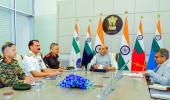'It is typical of China's strategic deception of making virtue out of necessity,' observes Rup Narayan Das.

Days after reiterating in a veiled message to India that China would stand by Pakistan, its Foreign Minister Wang Yi spoke to National Security Advisor Ajit Doval on May 1, 2025 condemning the terror attack in Pahalgam on April 22.
China's response is nothing but the hackneyed reiteration of standard refrain at least since the Kalachuk terrorist attack in Jammu and Kashmir in May 2002.
China's stance to Operation Sindoor was couched in a recent editorial 'Peace of paramount importance' in the State owned China Daily. The editorial conceals more than what it reveals.
In the first place it bracketed India and Pakistan as two arch rivals in South Asia. Rivalry can be there between two equals. On what parameters China places India and Pakistan together is intriguing if not mischievous.
Then the China Daily says that India started the escalation by launching the air strike to avenge the killing of 26 people by terrorist in Pahalgam.
Did Beijing expect India to take it lying low and allow the terrorists get away with impunity?
Instead of recognising India's air superiority and military might which inflicted and humbled the Pakistan army which literally begged for a ceasefire, the China Daily editorial credited diplomatic efforts by China, Saudi Arabia and Turkiiye for the ceasefire.
Significantly, it did not mention the US role. The editorial said, '...Given the important role China plays in the region, particularly close relations with Pakistan, which quickly gained the upper hand in the conflict after India's first wave of attacks, it is fair to say Beijing played a very key role in helping calm the situation.'
Nothing can be further from the truth. What role China played the world doesn't know; at best it might have asked Pakistan to yield before it was too late to shallow the bitter pill of humiliation and catastrophic disaster.
China got the first taste of India's resolve in Galwan in June 2000, and now witnessed new India's stealth in the sky on the India-Pakistan border. It is typical of China's strategic deception of making virtue out of necessity.
India has been the victim of terrorism for long and the world including the USA had turned a deaf ear to India's concerns.
Only when 9/11 happened did the USA realise that terrorism anywhere in the world is a threat everywhere.
Pakistan's complicity in terrorism was exposed in the wake of Osama Bin Laden's presence and killing in the Pakistani territory of Abbotabad on May 2, 2011.
After bin Laden's death when the US-Pakistan relationship suffered a severe jolt and China swiftly extended solidarity to Pakistan, then Pakistan prime minister Yousuf Raza Gilani's description of the relationship between the two as 'one nation, two countries' crossed the limits of vassalage.
A news report in the China Daily then said, 'the US military assault that killed Osama bin Laden in Pakistan will inevitably alter Washington's approach to Islamabad and India may stand to gain'.
The report further added, 'but with bin Laden's death fueling doubts about the viability of the US-Pakistan relationship and removing the original reason for American military involvement in Afghanistan, Washington's primary focus may shift back to New Delhi as the region's economic and political heavyweight.'
China quickly provided Pakistan with 50 JF-17 Thunder multi-role jets under the co-production agreement. Those fifty planes were equipped with more sophisticated avionics.

Bin Laden's presence in Pakistan is vindication of India's consistent position that Pakistan is the breeding ground of terrorism, which has hugely affected India.
India has been sensitising the international community for long to fight the menace of terrorism.
New Delhi has also been impressing Beijing to exert its clout on Pakistan, its 'all-weather friend'.
Beijing's response has at best been lukewarm or rhetorical.
True, Beijing condemned the terrorist attack on Parliament in December 2001, but Beijing's response to the terror attack on Mumbai in November 2008, added and abated by Pakistan, was not reassuring.
In the strategic nexus between China and Pakistan, it has been China's objective to counter India in South Asia, While the close defence cooperation between Pakistan and China is just one aspect of this objective, the shielding of Pakistan-based terrorist organistions and perpetrators of terrorism operating from terrorist dens in Pakistan by China is a matter of concern for India.
Besides supplying arms and ammunition, missiles, nuclear technology and developing infrastructure in Pakistan occupied Kashmir, Beijing has been extending open support to Pakistan and Kashmiri separatists through its opposition to the UN Security Council ban on jihadi organisations targeting India.
Listing of terrorists and terrorist organisations under UNSC 1267 obliges countries to impose sanctions against them.
China, which wields veto power in the security council, is empowered to block such listings.
India has been urging sanctions against terrorist organisations Lashkar-e-Tayiba and Jaish-e-Mohammad.
China has placed a technical hold on the Indian request ostensibly on the ground that India did not provide sufficient information.

While China's relationship with the USA, Russia Japan and other countries in the region and the world around has oscillated between friendship, estrangement and conflict and vice versa, its relationship with Pakistan has been warm and cordial all through.
This enduring alliance nurtured over the years witnessed its full blossom in April 2005 when China and Pakistan signed the Treaty of Friendship and Cooperation and Good Neighborly Relations.
The strategic depth between the two countries was succinctly summed up by then Pakistan president Asif Ali Zardari when he wrote in an op-ed, 'No relationship between two sovereign states is as unique and durable as that between Pakistan and China'.

Over the years, China has been supplying both conventional weapons and nuclear technology to Pakistan which has security implications for India.
The nuclear weapons supplied by China to Pakistan have the capacity to strike at cities across India.
China supplied the first batch of M-11 missiles (the Ghaznavi) in 1991-1992. This missile has a range of 300 km. Towards 1993, Beijing started supplying Islamabad with nuclear capable medium range DF-15/M-9 missiles (called 'Shaheen 1' by Pakistan) with a range of 600 to 750 km.
This supply was in violation of the Missile Technology Control Regime. The M-9 has the range to target cities and towns in north India.
While India has been wary all along about infrastructural development in PoK with Beijing's active support, an oped article in The New York Times by American journalist Selig S Harrison a few years ago, quoting intelligence sources, mentioned that Pakistan is quietly handing over control of the strategic Gilgit-Balistatan region in PoK to China.
An estimated 7,000 to 11,000 soldiers from China's People's Liberation Army moved into the area to develop the railway system.
Besides constructing the railway system, Selig Harrison's article mentioned that the PLA was extending the Karakoram Highway that was constructed to link China's Xinjiang province with Pakistan.
It further mentioned that the PLA soldiers are also constructing 22 tunnels in secret locations, which the Pakistanis are not allowed to enter. It was speculated that the tunnels would be necessary for a projected gas pipeline from Iran to China that would cross the Karakoram through Gilgit.
But they could also be used for storing missiles.

Yet another aspect of the Sino-Pak relationship is the cooperation in nuclear technology, which has grave security implications for India.
China signed the first nuclear agreement with Pakistan in 1991 to supply a 300MV nuclear power plant at Chashma.
The reactor was based on the first indigenous nuclear reactor developed by China at Qinshau which became operational by 1993.
The Chasma reactor became operational in 2000. China signed the second agreement with Pakistan in May 2004, the year China joined the 46 member Nuclear Supplier Group.
Pakistan's penchant for nuclear energy picked up after 2005 when the India-US nuclear deal became a reality.
Both Beijing and Islamabad have been worried about the growing economic, military and political ties between India and the US.
It was against this backdrop that Islamabad claimed in October 2008 immediately after then president Zardari's visit to China that China would assist Pakistan in building Chasma-3 and Chasma-4 reactors in Pakistan.
As the NSG guideline stipulates that members can sell nuclear equipment and material only to countries that are party to the nuclear Non-Proliferation Treaty or who accept full-scale safeguards, China was under obligation to obtain the NSG's nod to supply two nuclear reactors to Pakistan.

The after effects of India's punitive action is fraught with the possibilities of strong resentment and divisions within the phalanx of Pakistan's power structure.
India's strategic posturing and communication need to be carefully calibrated to keep the window of opportunity to repair the relationship with its estranged neighbour.
India's strategic communication should make it clear that India is not against the people of Pakistan while it is opposed to State-sponsored terrorism at the behest of the military cartel.
A stable and prosperous Pakistan is as much in India's interest as a strong and developed India.
New Delhi expects Beijing to show sensitivity to India's concerns and given Beijing's clout over Islamabad, the former can certainly exert its influence on the latter.
Dr Rup Narayan Das is a former senior fellow at the Manohar Parrikar Institute for Defence Studies and Analyses and the Indian Council of Social Science Research at the Indian Institute of Public Administration. Views are personal.
Feature Presentation: Aslam Hunani/Rediff.com










